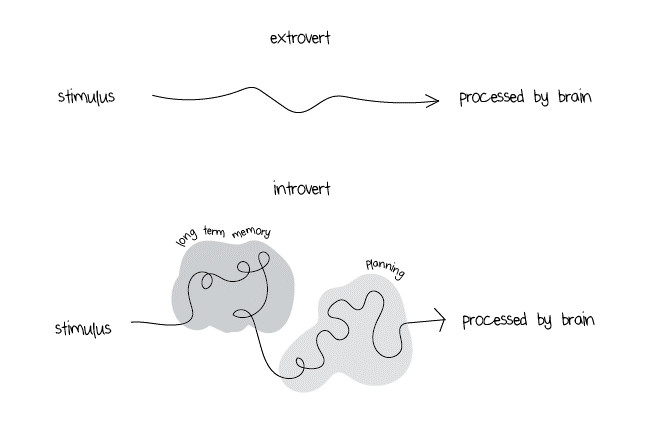You’ve had a long day at work. Your nerves are wrenched. You’re unable to make decisions. You can’t think clearly. You’re zoning out. And you just want to be left alone. You don’t like feeling this way, but you don’t know what to do.
You’re experiencing what introverts call The People Hangover. It happens every day. You come home from work and want to collapse from exhaustion. You’re reaching your limits and don’t know how much more you can take. You think if people exhaust you daily, then not working with people is the answer, right?
Well, sure, those jobs exist. But are you going to quit the job you love and live in the wilderness hunting boar so you don’t have to deal with people?
No.
You need help dealing with your introvert side in your daily job now.
Well, look no further. This guide provides the top ten essential tips you can start implementing now. You can succeed as an introvert at work without changing your career. And you’ll be one step closer to thriving in your role without sacrificing your sanity.
- Set Boundaries in the Workplace
Let’s start with the most difficult. You have nosy co-workers. They make too many demands on your personal life. They ask personal questions and interrupt your work. What can you do?
Psychotherapist Janet Zinn suggests you share your preferences early on. Tell them you “put your headphones on because music helps me focus and get the most of my crunch time. So when you see me with headphones, a stop by isn’t the best way to communicate with me at that moment, but do send me an email.”

Too late, you say?
Even if you’re a seasoned veteran and you’ve worked with your colleagues for years, start initiating changes now. Think about your co-workers. Most extroverts like talking about themselves. You rarely need to spout off. Keep it light and formal. Talk about TV shows, shared experiences, and people at work. Don’t get too serious on topics. Your coworkers will start to get the hint about the new boundaries you’re setting.
- Give Pushback
Co-workers invite you to lunch daily. But it’s your decompression time so you say no. After the fourth time this week, you cave in and mess up your entire day. It’s a common mistake introverts make. You don’t push back for fear your co-workers decide you’re cold.
Bad idea.
Part of setting boundaries is sticking to them. That means being firm. Don’t feel the social pressure to say yes. The same goes for projects at work requiring face-time with many co-workers. Know in advance you need more alone time. Stand up for yourself when the time comes, and you’ll demonstrate leadership, confidence, and competency.
- Prepare for Meetings and Presentations
Is it tough for you to respond to stimuli and problems instantly? It takes time for you to process what’s happening and come up with a game plan. But it’s science—you have a longer neural pathway for processing stimuli.

So—if you know a big meeting is coming up, make sure you’re well prepared. Let’s say you have a weekly meeting with your team. You must recap your work for the past week. Extroverts might think on the fly about what they’ll say. You’re different. And it’s even harder when you have to give a presentation.
A presentation is even harder because co-workers will ask you follow-up questions. And faster responses dominate. That doesn’t mix well with your internal processing speed. If you want to be prepared for the onslaught, you can do two things. First, write down possible questions people may ask.
Secondly, talk through your responses before the presentation. And it’s okay to ask for time to think. Say the following: “I’m hearing some good points, and I have some thoughts on this, so I’d like to come back to it later.”
- Make Yourself Heard
You’ve prepared for the meeting. You have your answers ready. But the extroverts took over. They went back and forth, talking over one another, leaving no room for others to give input. You powered down and clamped your mouth. Doesn’t scream leadership, does it?
You’re making the wrong choice here. The reason you prepare for meetings is to have something valuable to say. As hard as it may be, you need to take charge. Doing that tells management you care, and you’re involved in the process. Follow through on your preparation and present your plan. You know what needs to be said. Make sure people hear it.
- Show Your Wins
You’re aiming for a promotion. You’ve met your goals. You’re on the right path. But your supervisor is surprised by your progress at the end of the month. What happened?
Well, introverts don’t boast about their achievements. They tend to be humble. That’s a good trait for any employee. But it has its downside. Don’t put yourself in a position where others overlook your achievements.
You have to make sure your co-workers and managers know when you’ve done something well. Take credit for your wins. Try saying when I finally closed the deal with client X, I tried out a new tactic.” It’s not verbose and pompous, but it shows you reached a goal.
- Opt for Email
Your manager strikes up a conversation with you. It starts off light but takes a serious turn. He asks about the latest A-B test this week. He wants to know what insight you gathered and how the process can get better. You panic. You can’t get your thoughts together in a focused way.
It’s every introvert’s worst nightmare. What do you do? Well, part of establishing boundaries and giving pushback can help here. Tell your colleagues and managers in advance how you don’t like to communicate. If they forget, remind them.
Don’t let it pass. But that’s not the whole story. You’ll have to express your desire to communicate difficult questions differently. What’s best for introverts? Email.
Email is an alternative communication method that works for introverts. Why? Because you don’t think quickly on your feet. If a manager or co-worker asks a hard question, tell them politely you have a lot to say and will write it down, so you have it as a resource to look back to. Emails also let you respond to the entire team rather than having to sit down with each of them.
- Make Your Work Layout Work for You
“Open” floor plans are the bane of introverts’ existence. Too many stimuli. Too many people buzzing by or worse, stopping to chat. How can you cancel out all the noise, sights, smells without losing your mind?

You’ll need to set up your personal fort. You must build those barriers to guard yourself against the onslaught of people and menial small talk. First, your virtual wall. Position your monitors in a way that shields you from others. If you can, add a few plants around your desk to create a virtual wall.
If there’s too much noise around you, buy yourself a pair of noise-canceling headphones. Having those on signals to others you’re off limits. But don’t forget, the open floor plan has its upside too. It allows more sunlight in, plus the larger feel makes you less claustrophobic. Staying conscious of the benefits will help you tolerate it.
- Schedule Your Alone Time
Sometimes the fort won’t be enough. You’re not foolproofed from social interactions. People will still need your input. You’ll have to collaborate with them. But as an introvert, you need time alone to decompress. And it’s not just about how you feel—your work will suffer too. Introverts are more productive and efficient when they have time to think by themselves.
What can you do? Make it a point to carve out time in your schedule to be by yourself. Put it in your calendar as brainstorming or preparation time.
If someone tries to you get you to go to lunch or attend an ad-hoc meeting, you can simply say, “I’m booked during that time.” During lunch, try to get out of the office as much as you can. Take your sandwich into the park across the street. If you can’t, find a space at work where people don’t congregate. Eat in your car if you have to. Whatever it takes, make it your own time away from all stimuli. Most workplaces have silent rooms and conference rooms you can reserve ahead of time.
- Follow the Lead of Others
Okay, so you want to interact with others, but don’t know where to start. All you want is to say hello, but it turns into a 20-minute conversation. And then you can’t take it anymore and you get short with the person. Another social interaction bites the dust.
Well, turns out you’re going about it all wrong. Start by channeling your introverted side. What do you do best? You have keen listening skills. Embrace it. It shows to others you are genuinely interested in what they have to say. Most extroverts want to talk about themselves. Let them. And you’ll see these social interactions as a script with minimal action on your side.
- Build an Alliance
Let’s say an extrovert spots you eating lunch alone. She thinks how terrible you must feel having to be by yourself. She pulls up a chair next to you. Anger bubbles up inside. Oh great, you think, guess performing is in order the next 30 minutes.
Here’s an easy solution—build an alliance of introverts at work. Look for those who are similar to you and befriend them. Ask them to accompany you to lunch or hang around them during office social events. Conversations can be brief and surface-level. Or, you can vent about the extroverts who don’t leave you alone during the day. And most times you won’t have to talk at all. You can just sit near each other and do your own thing, but it blocks the extroverts from sitting next to you. You won’t feel as isolated in an extroverted world when you have introverted warriors bracing the day with you.